Items
Tag
publichistory
-
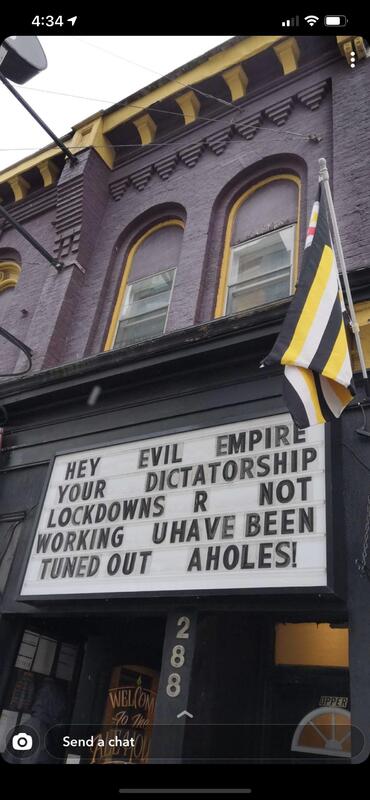 2020-12-17
2020-12-17New Ale House Sign: London ON, Canada
A pub in downtown London Ontario, Canada has been making its opinion of the pandemic restrictions heard through their ever changing sign out front. -
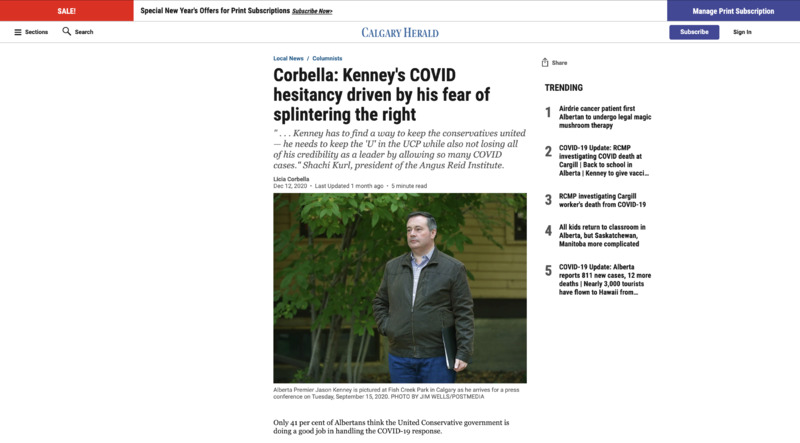 2020-12-12
2020-12-12Corbella: Kenney's COVID hesitancy driven by his fear of splintering the right
" . . . Kenney has to find a way to keep the conservatives united — he needs to keep the 'U' in the UCP while also not losing all of his credibility as a leader by allowing so many COVID cases." Shachi Kurl, president of the Angus Reid Institute. -
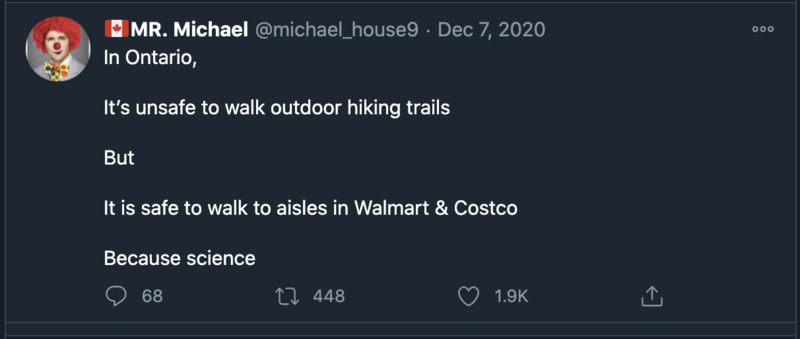 2020-12-07
2020-12-07Tweet: Ontario Safety
"In Ontario, It’s unsafe to walk outdoor hiking trails But It is safe to walk to aisles in Walmart & Costco Because science" -
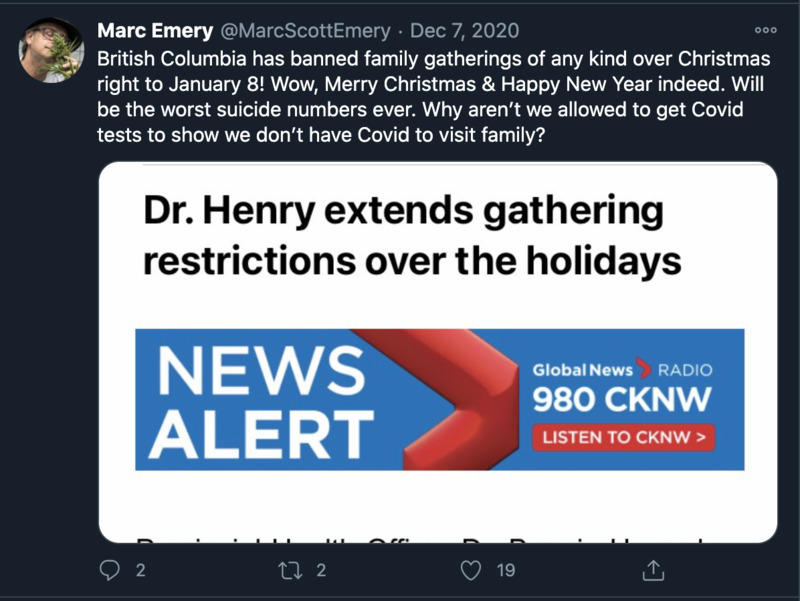 2020-12-07
2020-12-07Dr. Henry extends gathering restrictions over the holidays
Tweet: "British Columbia has banned family gatherings of any kind over Christmas right to January 8! Wow, Merry Christmas & Happy New Year indeed. Will be the worst suicide numbers ever. Why aren’t we allowed to get Covid tests to show we don’t have Covid to visit family?" -
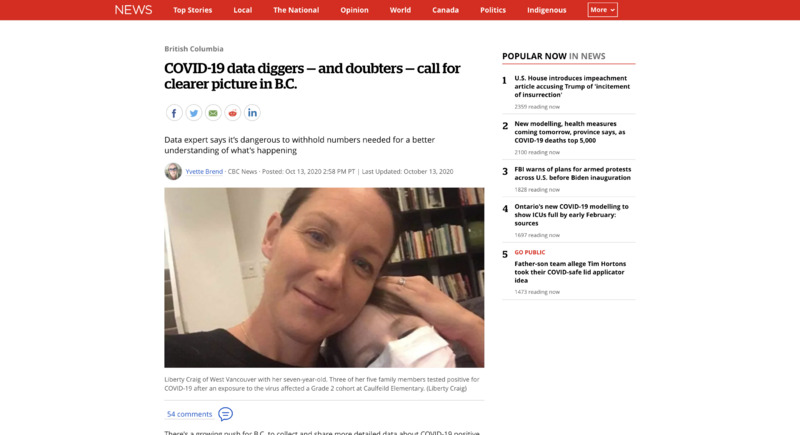 2020-10-13
2020-10-13COVID-19 data diggers — and doubters — call for clearer picture in B.C.
There's a growing push for B.C. to collect and share more detailed data about COVID-19 positive hotspots. Last week, hundreds of parents called on the provincial health officer to divulge more data so that people can make informed decisions as a new wave of infections hits the province. This week, epidemiologists, data analysts and former federal health minister and Toronto doctor Jane Philpott called for "radical transparency" around Canadian COVID data. -
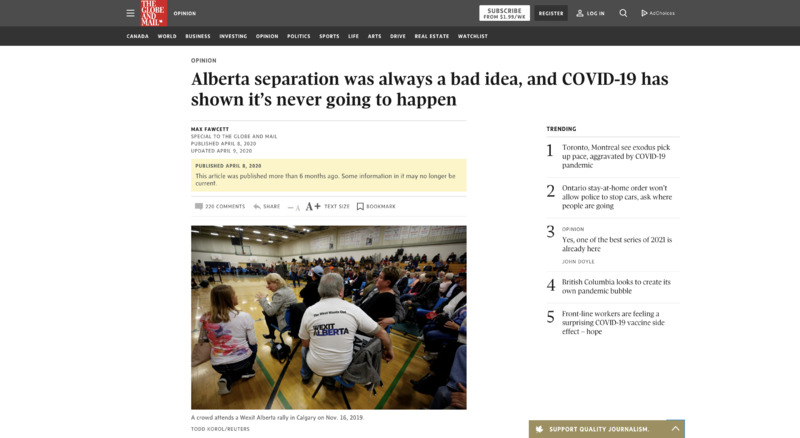 2020-04-09
2020-04-09Alberta separation was always a bad idea, and COVID-19 has shown it’s never going to happen
But for Alberta’s separatist movement, it’s a major setback. That’s because, just as there are no atheists in foxholes, there won’t be many people who believe they’re better off on their own after this pandemic finally passes. As Albertans stare at the possibility of an economic downturn that’s reminiscent of the Great Depression, some of them are realizing they could use a little help from their friends – even the ones they don’t particularly like. -
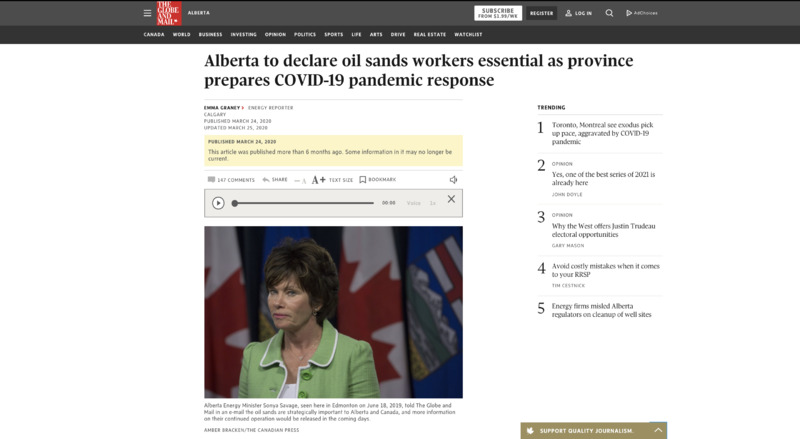 2020-03-25
2020-03-25Alberta to declare oil sands workers essential as province prepares COVID-19 pandemic response
Oil sands workers will be declared essential in Alberta as the province prepares a list of who will keep working should it need to ratchet up its response to the COVID-19 pandemic. Ontario and Quebec shuttered all non-essential businesses Monday in a bid to slow the spread of the novel coronavirus. Essential workplaces in those provinces include supermarkets, gas stations, pharmacies, takeout and delivery restaurants, hotels, and hardware, liquor, beer and cannabis stores. -
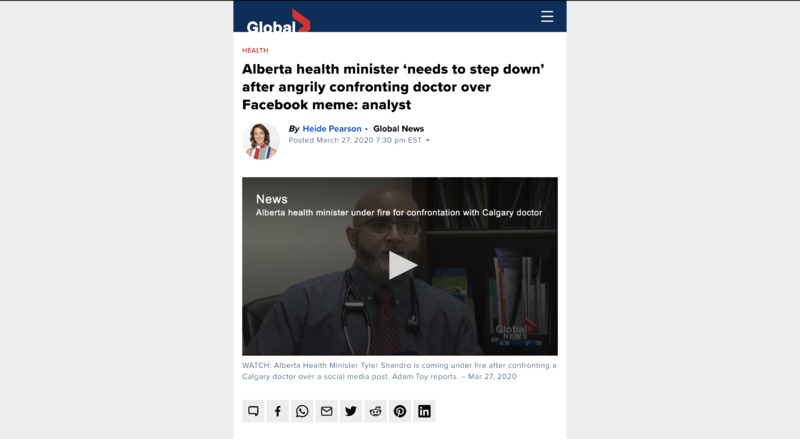 2020-03-27
2020-03-27Alberta health minister ‘needs to step down’ after angrily confronting doctor over Facebook meme: analyst
Political scientist Duane Bratt says Alberta’s health minister needs to resign from his position, or be removed from caucus, after it came to light he and his wife went to a doctor’s personal home and angrily confronted them over a meme. -
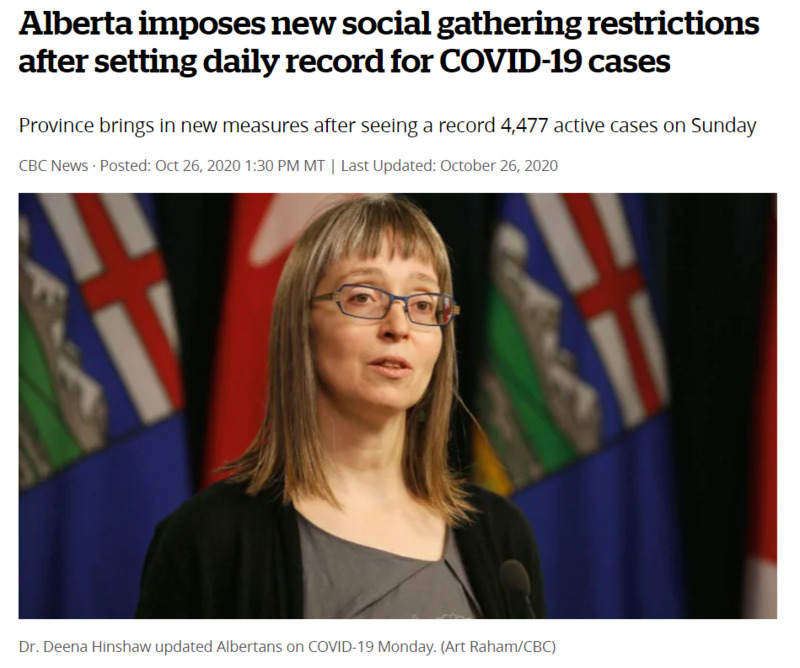 0020-10-26
0020-10-26Alberta imposes new social gathering restrictions after setting daily record for COVID-19 cases
Alberta brought in new mandatory limits of 15 people at most social gatherings in Edmonton and Calgary on Monday after the province reported 1,440 new cases of COVID-19 over the weekend, including a record of 572 on Saturday. -
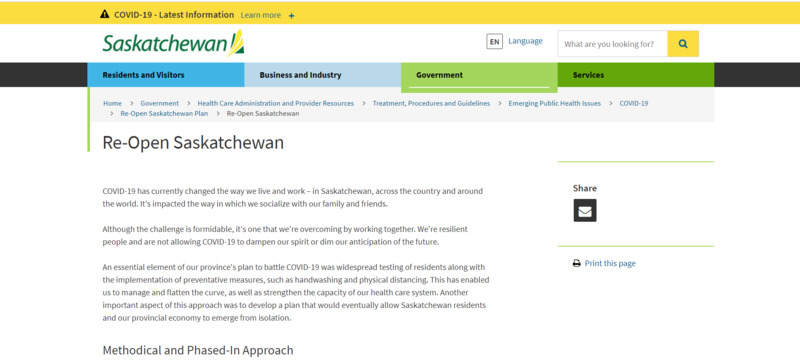 2020
2020Re-Open Saskatchewan
An essential element of our province's plan to battle COVID-19 was widespread testing of residents along with the implementation of preventative measures, such as handwashing and physical distancing. This has enabled us to manage and flatten the curve, as well as strengthen the capacity of our health care system. Another important aspect of this approach was to develop a plan that would eventually allow Saskatchewan residents and our provincial economy to emerge from isolation. -
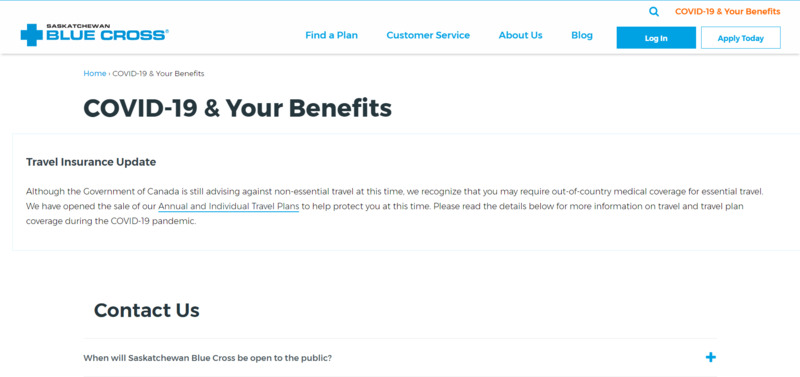 2020-10-07
2020-10-07COVID-19 Information
Saskatchewan Blue Cross is taking measures to attend to the health and well-being of our employees, our members and our communities. We’re committed to serving you in your time of need. We’re here for you. Please see below a series of frequently asked questions regarding COVID-19 and your benefits. -
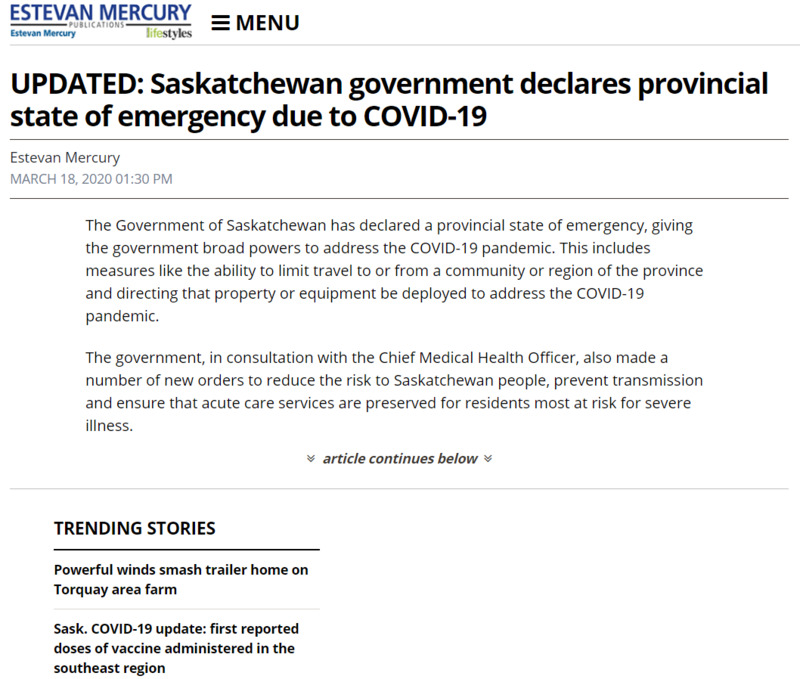 2020-03-18
2020-03-18UPDATED: Saskatchewan government declares provincial state of emergency due to COVID-19
The Government of Saskatchewan has declared a provincial state of emergency, giving the government broad powers to address the COVID-19 pandemic. This includes measures like the ability to limit travel to or from a community or region of the province and directing that property or equipment be deployed to address the COVID-19 pandemic. -
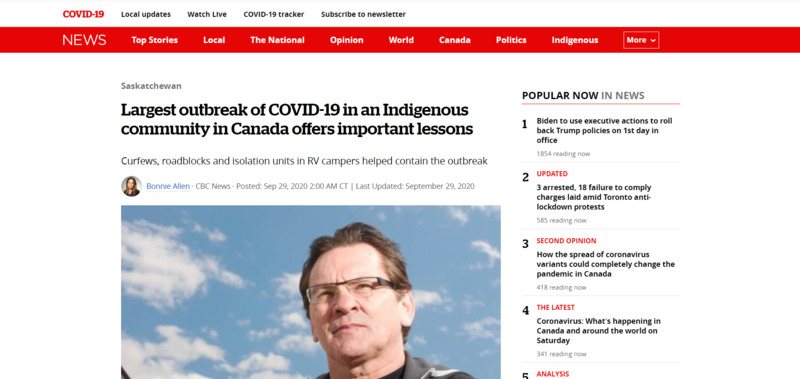 2020-09-29
2020-09-29Largest outbreak of COVID-19 in an Indigenous community in Canada offers important lessons
In the wake of a large outbreak of COVID-19 in northwestern Saskatchewan — the most serious of any Indigenous community in Canada — health officials and local leaders are relying on what they learned during the three-month ordeal to plan for potential outbreaks in other remote, rural areas. -
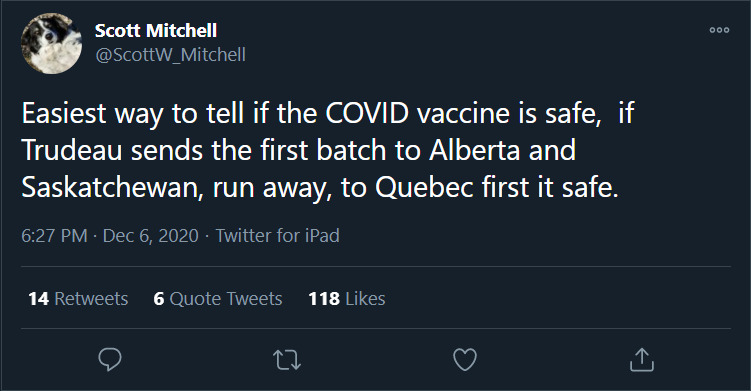 2020-12-06
2020-12-06Tweet: Vaccine Safety
"Easiest way to tell if the COVID vaccine is safe, if Trudeau sends the first batch to Alberta and Saskatchewan, run away, to Quebec first it safe." -
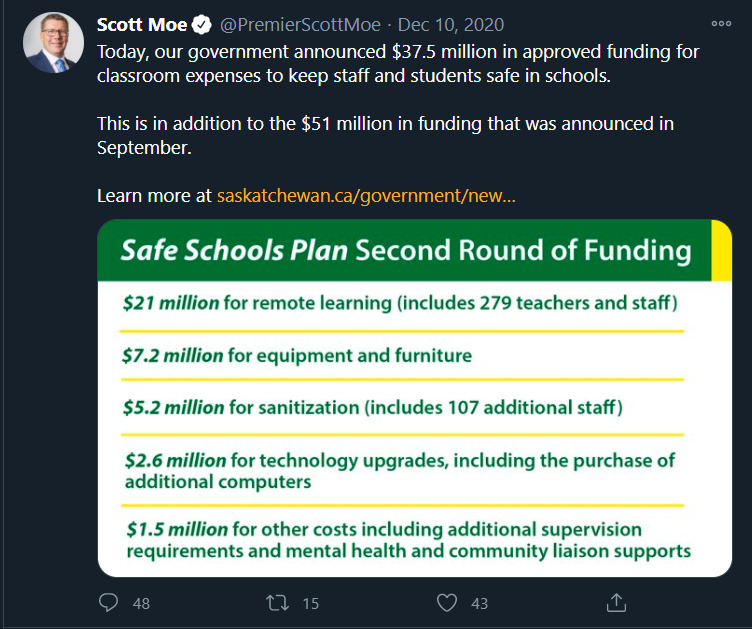 2020-12-10
2020-12-10Tweet: Safe Schools Plan Second Round of Funding
Today, our government announced $37.5 million in approved funding for classroom expenses to keep staff and students safe in schools. This is in addition to the $51 million in funding that was announced in September. Learn more at https://saskatchewan.ca/government/news-and-media/2020/december/10/safe-schools-plan-more-than-$37-million-allocated-to-school-divisions-in-second-round-of-funding -
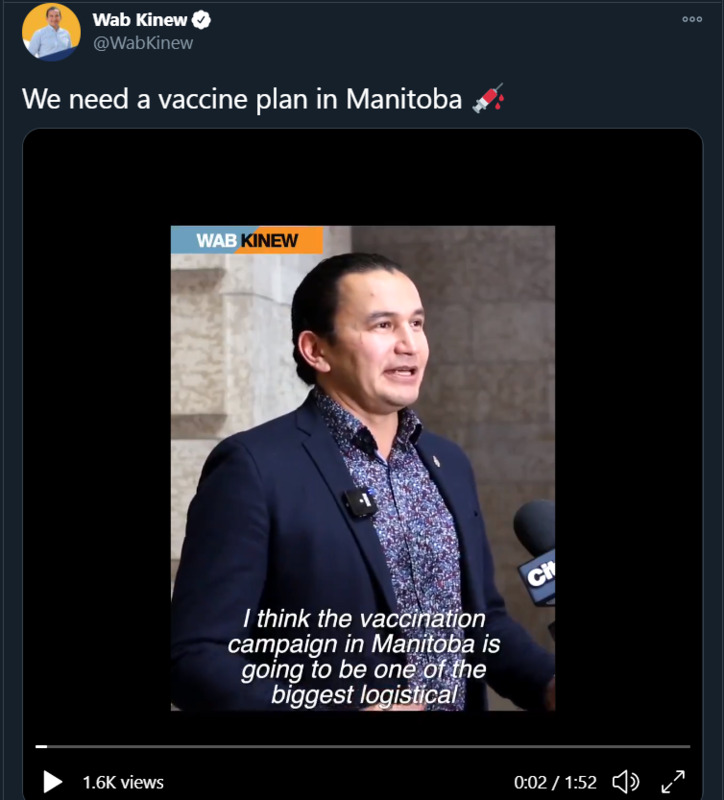 2020-12-07
2020-12-07Tweet: "We need a vaccine plan in Manitoba"
Twitter video of Wab Kniew calling on the Manitoba Government to create a vaccine plan for Manitoba -
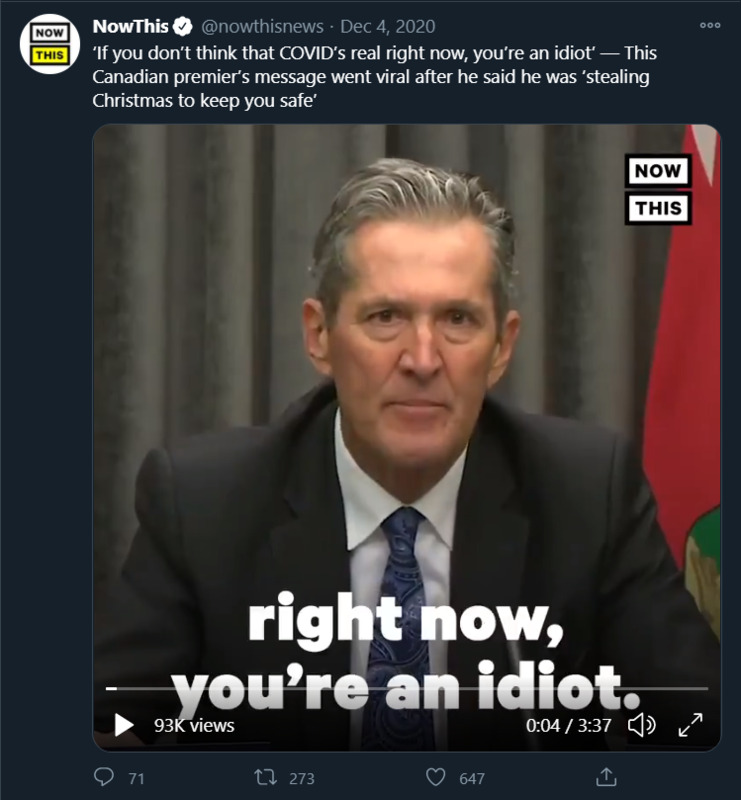 2020-12-04
2020-12-04Tweet: ‘If you don’t think that COVID’s real right now, you’re an idiot’
— This Canadian premier’s message went viral after he said he was ‘stealing Christmas to keep you safe’ -
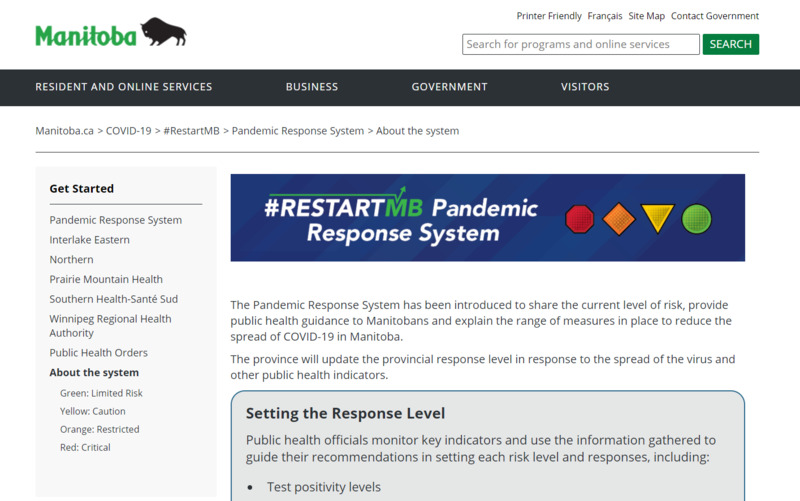 2020
2020#RESTARTMB Pandemic Response System
The Pandemic Response System has been introduced to share the current level of risk, provide public health guidance to Manitobans and explain the range of measures in place to reduce the spread of COVID-19 in Manitoba. -
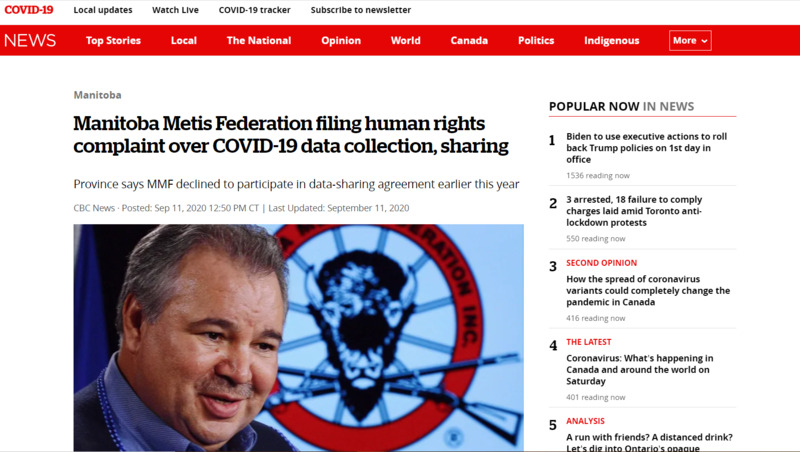 2020-09-11
2020-09-11Manitoba Metis Federation filing human rights complaint over COVID-19 data collection, sharing
The Manitoba Metis Federation plans to file a human rights complaint against the provincial government, its health minister and its top doctor, alleging discrimination in how Manitoba is collecting and sharing data linked to COVID-19 cases. -
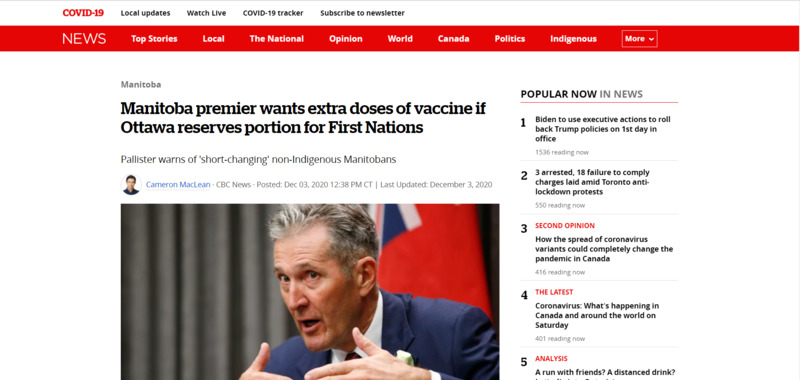 2020-12-03
2020-12-03Manitoba premier wants extra doses of vaccine if Ottawa reserves portion for First Nations
The federal government's proposed plan to reserve a portion of COVID-19 vaccine for First Nations would leave Manitoba with the fewest doses for the rest of the population, Premier Brian Pallister said. -
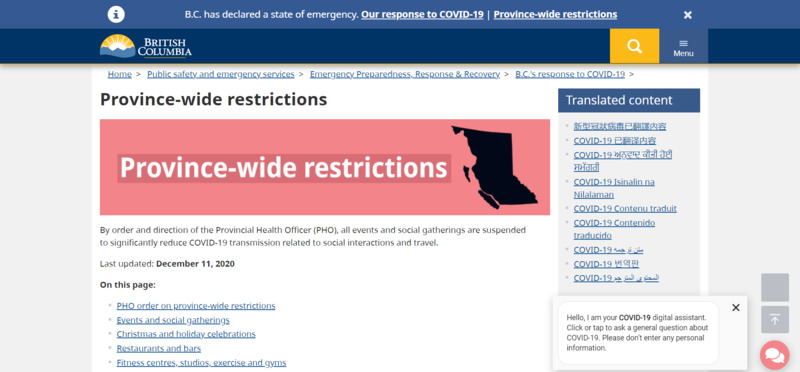 2020-12-11
2020-12-11Province-wide restrictions
By order and direction of the Provincial Health Officer (PHO), all events and social gatherings are suspended to significantly reduce COVID-19 transmission related to social interactions and travel. -
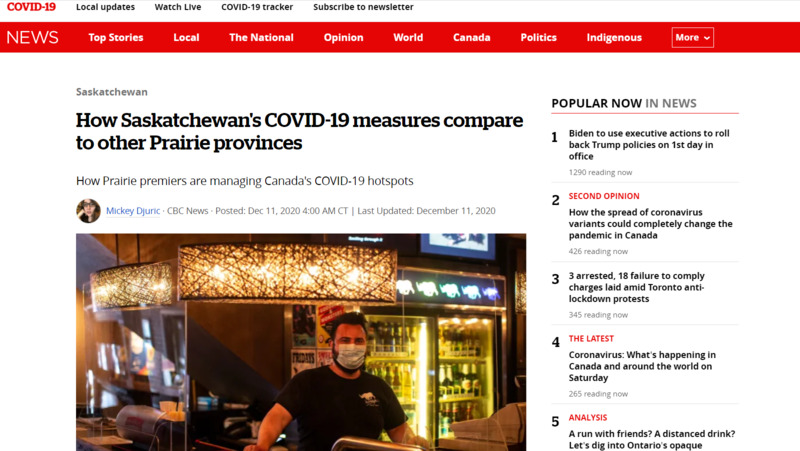 2020-12-11
2020-12-11How Saskatchewan's COVID-19 measures compare to other Prairie provinces
The Prairie provinces have become Canada's new COVID-19 hotspot as the region continues to break record after record for cases and hospitalizations. Saskatchewan, Manitoba and Alberta have consistently had the highest rate of cases across Canada since November, surpassing more populous provinces like Ontario and Quebec. -
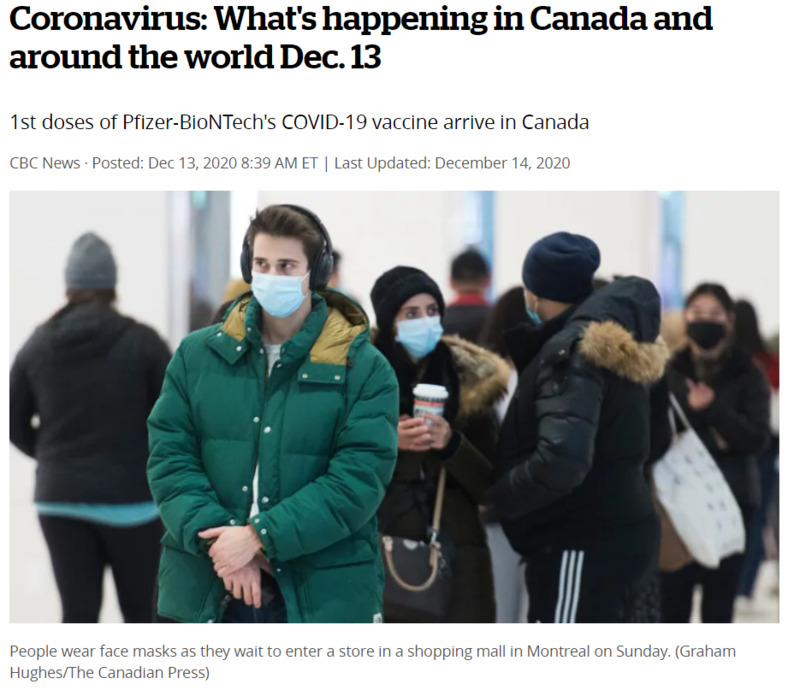 2020-12-14
2020-12-14Coronavirus: What's Happening in Canada and around the world Dec.13
Alberta reports its deadliest day of the pandemic with 22 new deaths. Fines issued to rally organizers in British Columbia, Saskatchewan. U.S. COVID vaccine campaign launches with trucks leaving Michigan facility. Germany to impose stricter lockdown to fight COVID-19. Do you have the COVID Alert app on your iPhone? It might not be working. -
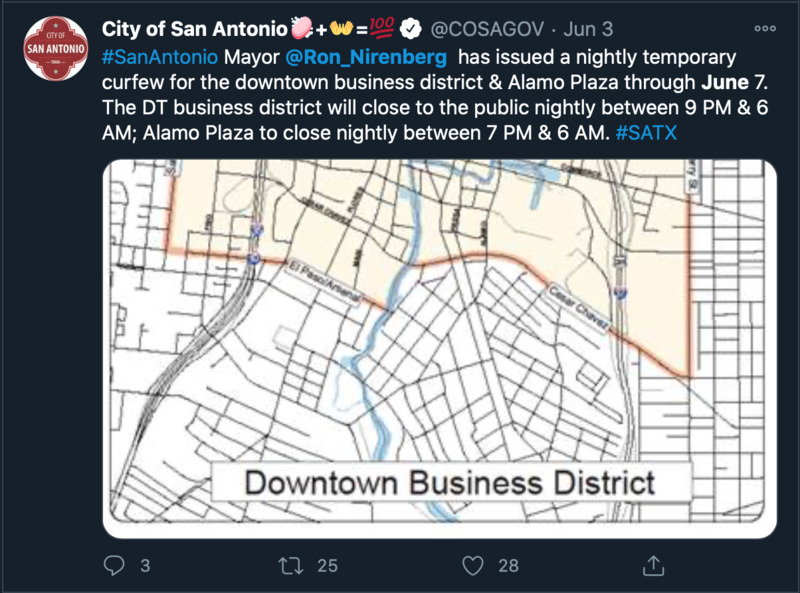 May 5, 2020 - August 31, 2020
May 5, 2020 - August 31, 2020M.A. in Zoom pt. 2: The Myth of Summer
This entry is the second part to capturing what the first six months of my graduate school experience was like. I’m a graduate student in the public history program at St. Mary’s University in San Antonio, Texas. I, like many students throughout all levels of education, felt a dramatic shift during or following spring break 2020. As the world began to catch on fire, I was just starting to piece together my final project which would enable me to graduate with my M.A. degree. Despite the chaos, I managed to survive the rest of the semester, and actually get a good head start on my project. I achieved two new job opportunities and reunited with my boyfriend after going two months without seeing each other. Things were going really well for me and I found a sense of confidence I hadn’t felt in three months. A confidence that might’ve crossed the line into arrogance. This is when I actually got serious about the pandemic. I chose to forget that just because things were going well in my world, didn’t mean things were going well in the real world. I, along with many of my fellow citizens, gave in to the idea that the south Texas heat would significantly curb the spread of the virus. As Texas began to open up, I began going out–not just for academic purposes but also for my own selfish desires to feel myself again. I returned to my local gym. I ate out (in doors) at restaurants. I went to an outdoor bar with my parents (one that was not abiding by the six feet separation policy). I heard the medical experts’ warnings against the loosening of restrictions; I was aware of the slowly but still increasing COVID cases in the city, but chose to act selfishly. This selfishness transferred over to my academic goals. I was blinded by my ambition (or anxiety) to hit the ground running with my capstone. Maybe I knew that after a certain point, it would no longer be safe nor socially acceptable to meet with people outside of my immediate community. The second and third photos were taken from the first sets of oral histories I conducted with my community partners, the Ballet Folklórico de San Antonio. This is Bonnie Ramos and Mark Molina, the head creative directors of the Ballet Folklórico de San Antonio. Prior to these interviews, I had to meet with these leaders to plan out these interviews. We were all fully ready to conduct in-person oral histories not only with these two, but also their friends and family members. In the second photo, we were more conscious of the virus as you can see Ms. Ramos is wearing a mask. However, in the following interview with Bonnie and Mark, done just [two] weeks later, you can see that we chose to let our guards down (falling in line with the rest of the San Antonio, and overall Texas, community). In both photos we made sure to keep a distance between us, but we did not measure exactly six feet. Off camera, we also made sure to interact at a distance, however, we all chipped in to set the interview setting. In between interviews I came down with a case of strep throat. I had to get tested for COVID and the results came two days later, which means my family and I held our breaths for two days. Thankfully I was negative, but strep really kicked my butt. I thought to myself, “If this is what strep feels like, I don’t want to know what COVID feels like.” The doctor was very sure that I only had strep because I had no other symptoms (such as respiratory difficulties). However, COVID is different for everyone – so I heard. I began to drown myself in COVID statistics which made me feel even worse; but also made me snap and understand that I cannot be my control freak self in the midst of a pandemic. Included are some images of COVID statistics in San Antonio from the point that I contracted strep until the end of August. I thought about all the times I had gone out, regardless of being aware that I shouldn’t; I thought of all the people I had interacted with and how ashamed I’d me if I would have to call them; I thought of what I could potentially be putting my parents through because they have underlying conditions (diabetes and asthma). After a few days on antibiotics I was alright, but this was a wakeup call and my Ballet Folklórico project came to pause. Then Fourth of July hit, and San Antonio really milked the reduced restrictions. In the following weeks, San Antonio saw a spike in COVID-19 and the city promptly regressed back to prior restrictions. I cancelled my gym membership, my family cancelled our annual trip to the beach, and abstained from interacting with some friends and family. My household became a little blue; I felt a mixture of shame, fear, and frustration (towards myself and the state of Texas). As a public historian, I felt like I failed the community I serve by acting in my self-interests. Public historians share a larger responsibility to treat out community justly and with respect. However, I chose to contribute to the problem that I knew was still there; I gave in to my selfish desire for “normalcy” and potentially put my community partners at risk. Luckily, neither of us (myself, Bonnie & Mark, nor my camera man) have experienced any COVID-19 symptoms following our interviews nor up until now. Throughout the rest of the summer, all of the oral histories I conducted for my capstone were done via Zoom. My project was slowly transitioning to become a digital project, but I’ve come to see this as a strength and necessary change. It does not seem like Texas will have this virus completely under control, and many individuals will be hesitant to interact physically or outside their homes. Creating something digital will meet the needs of individuals while still taking precautions, as well as be more accessible to other researchers beyond San Antonio. COVID had made me acquaint myself with advanced-ish technology that will make all my projects throughout my career more accessible and therefore more equitable -
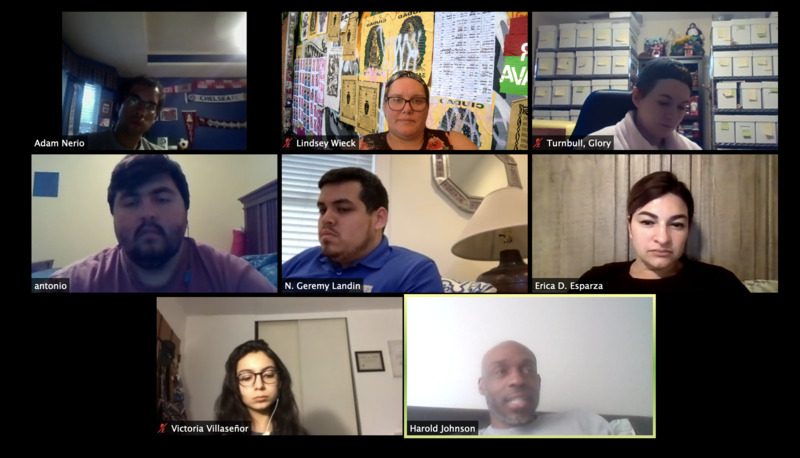 March 8 2020 - May 4, 2020
March 8 2020 - May 4, 2020M.A. in Zoom pt. 1: Initial Anxieties & Adaptation
This entry is part one of two entries that capture the first six months of my graduate school experience. I’m a graduate student in the public history program at St. Mary’s University in San Antonio, Texas. I, like many students throughout all levels of education, felt a dramatic shift during or following spring break 2020. Most institutions, like mine, extended our spring break by a week to brace campus for transitioning fully online. At this time, I was enrolled in a course called “Conceptualizing your Capstone.” As the world began to catch on fire, I was just starting to piece together my final project which will enable me to graduate with my M.A. degree. Perfect timing. These are images of what my first semester of graduate school kind of boiled down to: completing the initial, most crucial, stages of my capstone virtually and completing my fellowship with what I felt were limited resources. What is not pictured was my constant fear of the unknown. Initial Anxieties For my capstone project I’ll be looking at the development of ballet folklórico in San Antonio and its influence throughout the state of Texas. I was looking forward to digging in our university and local archives; Fiesta was around the corner and I would’ve used that as an opportunity to document the different folklórico groups set to perform; and most importantly I had planned on meeting with the community members I’m working with face-to-face. The last point there was particularly concerning for me. I’d have to reach out remotely to a community who seldom opens their vaults to outsiders. How was I going to establish credibility and convince these groups that they could trust me via an email or Facebook message? The whole concept of my capstone project also might’ve had to change. I was originally looking to create a narrative history of Ballet Folklórico in San Antonio by drawing on the experience of my community partners–they are the earliest 501(c)(3) groups established in the city. In regard to my schoolwork, how was I going to produce legitimate work from the confines of my house? Was I even in the right place mentally and emotionally to perform at graduate level amidst social, political, and medical disarray that was being broadcasted? I was starting to get cabin fever; I could’ve ignored the commotion outside so I could focus, but that felt selfish. How could my mind be everywhere at once, yet my body needed to remain indoors? (These are actually a bunch of large questions I’ve had swirling in my head throughout the rest of March.) In late March, one of my brothers who’s a Texas State Trooper was ordered to quarantine for two weeks after someone in his unit contracted the virus. Then in mid-April, my other brother came down with something that gave him body aches, chills, fever, and made him sleep all day. No respiratory issues, however, we had no idea what was going on. He got tested for COVID and his results took four days to come back. Both my brothers tested negative, but these two events made it seem like the virus was everywhere and inhibited my ability to think and produce sound work. Adaptation After a couple of dramatic weeks, I got to a point where I could realize the amount of privilege my family and I managed to hold on to regardless of the dystopian-like transitions we were going through as a society. My dad and brothers could still commute to work (that has never been compromised throughout the past nine months), and my mom and I have been able to work from home; neither of us experienced a cut to our pay nor hours; I could get back to a regular sleep schedule because I no longer had to commute from campus, which is on the other side of town, late at night; we have stable WiFi; we have insurance; we’ve been able to pay our bills on time. In terms of academics, contrary to my initial anxieties, my experience in graduate school wasn’t really compromised. I had already established relationships with my peers and professors so Zoom classes and weekly meetings for my fellowship didn’t feel so awkward. Even if I didn’t have the first half of the semester to acquaint myself with my classmates, my generation is very much accustomed to digital communication. We literally grew up on it; we witnessed the evolution from wall phones to smart phones. Making digital connections isn’t a foreign concept to me. The pace of graduate school also didn’t change much. Yes, not having to commute to campus really alleviated a lot of my stress. However, the sense of urgency in graduate school did not fade one bit. I also underestimated the digital literacy of older generations. Specifically of the ballet folklórico community throughout Texas. Through the power of Twitter, Facebook, JSTOR, online university archives, and Zoom, I was able to build upon my research for my capstone. The individuals and groups I reached out to for help were surprisingly eager and generous. Maybe we were all craving some new faces or voices to interact with, or maybe I underestimated the power of engagement. I was able to build upon my capstone, and was probably more productive with it given that I had to stay in one place and work. Optimism was in the air. The first photo is a screenshot of our final presentations where we pitched our capstone idea to the St. Mary’s history department. We were originally set to present our capstone idea to the public history department (staff and students). Initially, I thought this experience would be compromised. I thought I’d miss out on forming connections with other professors in the program. However, there was a collective understanding these young academics (my peers and I) are in the midst of creating one of the most important pieces of our careers under unimaginable outside challenges. All hands were on deck in making sure we received the most help and access to whatever resources. It reinforced that I belonged to a community grounded in the belief that regardless of the circumstances, our duty is to assist each other in our pursuit to public history. I hope other graduate students across the city, state, country, and world experienced this same empathy.
